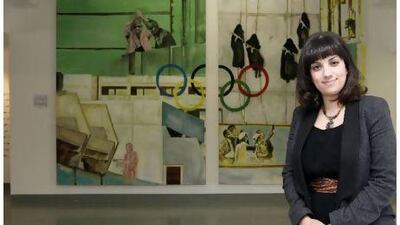SHARJAH // The Barjeel Foundation opened its doors nine months ago with ambitious aims: to find the story of the Arab world and share it through contemporary art.
Sheikh Sultan Al Qassemi, the co-founder of Meem Gallery in Dubai, non-resident Fellow at the Dubai School of Government and a weekly columnist with The National, created the foundation last year. It is designed to feature rotating exhibitions culled from his collection of 600 pieces from Arab artists in a permanent space in the Maraya Art Centre in Sharjah.
The pieces that go on display during the foundation's planned six-month exhibitions are available for lending to other institutions internationally.
The foundation's first exhibition, Peripheral Vision, drew the Austrian and Swiss ambassadors, the consul general of Japan and Jussi Pylkkanen, the president of Christie's Europe. The second exhibition, Residua, opened in October and runs until February 20. It has already been visited by Princess Benedikte of Denmark.
But aside from high-profile visitors, the foundation is helping introduce Arab artists to the international contemporary art scene.
Jeffar Khaldi saw his acrylic painting Special Report, which depicts schoolchildren amid the Gaza war, shown during the first exhibition. His enormous work Munich Glamour (a 480x280cm painting), an interpretation of the terrorist attacks on the Munich Olympics, is taking pride of place in the second.
Mr Khaldi said: "Considering the population of the Arab world it is a shame that you can count on the fingers of one hand the number of people who do this kind of thing. For this reason Sheikh Sultan's foundation is very important to this region."
In less than a year, six pieces from the foundation have been shown at Zoom Art Fair in Miami, which finished on Sunday, and one piece in Istanbul, until December 26, at the Edge of Arabia show. From June to December next year, a painting by the Saudi artist Abdulnasser Gharem will be placed in the Institute of Foreign Cultural Relations in Berlin and Stuttgart, Germany.
There are also 33 foundation artworks on display in the Offset Bureau in Abu Dhabi and four in the DIFC Courts. Khaled Hafez's Divine Exodus and Abdulnasser Gharem's Concrete Block are on exhibit at Emirates Palace, a showing organised by Abu Dhabi's Tourism Development and Investment Company and Christie's auction house.
Mandy Merzaban, 23, Barjeel's gallery manager, said while the project was still at the beginning stages, she was pleased with its progress.
"There is still so much to do," she said. "Documenting, making a catalogue and setting up more collaborations, but for the start I'm happy with the way things are going. I can only see it getting better."
Miss Merzaban curated both exhibitions and she works closely with institutions which express an interest in showing the art. It is important, she said, to find the right work to fit the right show.
Steve Sabella (whose photographic work In Exile, based on his conception that his city of birth, Jerusalem, does not exist, went to Zoom Art Fair) said the foundation was clearly formed according to vision and taste rather than on the basis on "art market fevers".
Although it is too soon to tell if there have been any benefits from the overseas exposure, he said he had received many e-mails regarding his inclusion in Residua, which opened in October.
"[This] is an indication that synergy is at work," he said.
Mr Sabella said that the foundation had a sound reputation, with people in London, where he is living, congratulating him on being part of the collection.
"The Barjeel Foundation can set an example of how to inject artists with critical acclaim," he said.
Jawad al Malhi, whose work House No 197 is an intricate, six-metre-long photograph of a Palestinian refugee camp, said it was important to have his work available to audiences worldwide.
"Art plays a very important role in challenging stereotypes and Arab artists in particular have an important role in provoking 'the West' to reflect on its stereotypes of the Arab world," he said.
Mr Sabella added that the gap of knowledge in the West about Middle Eastern art was diminishing with efforts like the foundation.
"To change perceptions takes time, but as long as the mission and vision of educated individuals thrive, stereotypes are bound to be shattered in the end."
Sultan Al Qassemi's weekly column appears on page a22

